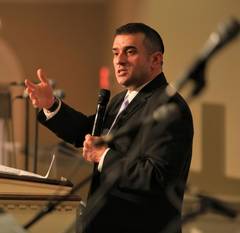- About Us
- Learning
- Resources
- Get Involved
- Membership
- Jobs
Death Cafe in the Sukkah
10/22/2019 02:16:27 PM
Matt Harle
| Author | |
| Date Added | |
| Automatically create summary | |
| Summary |
 I think this may be a story of control submitting to grace. But first some background. For six years now, my synagogue, Beacon Hebrew Alliance in Beacon, NY, has built a sukkah in a public park on Main Street. Each year there’s a different theme, with programming reflecting that theme. This year, for a variety of reasons, the sukkah almost didn’t get built. But as Sukkot approached, the loss seemed too great, and we rallied to get it done.
I think this may be a story of control submitting to grace. But first some background. For six years now, my synagogue, Beacon Hebrew Alliance in Beacon, NY, has built a sukkah in a public park on Main Street. Each year there’s a different theme, with programming reflecting that theme. This year, for a variety of reasons, the sukkah almost didn’t get built. But as Sukkot approached, the loss seemed too great, and we rallied to get it done.
As the organizer and nominal leader of BHA’s Chevra Kadisha, I’ve tried, over the past year since its establishment, to find ways of involving the community and increasing its awareness of the Chevra. Some of those attempts have included a 7th of Adar celebration, a Death Cafe, a showing of the film “Departures”, an “Eth Cafe” (an ethical will/living will workshop), and a tachrichim sewing group. Given that the theme of this year’s sukkah was conversation, I felt a reprise of the Death Cafe would be a good fit.
When I held my first Death Cafe in the Spring, I went to great lengths to create a cafe-like atmosphere in the somewhat drab environment of the BHA community room: there were checkered tablecloths, candles, low lighting, and the requisite coffee, tea and dessert. Over 30 people showed up, conversation flowed, and the evening, I think, was a success.
Returning now to the present. I had scheduled this second Cafe for Thursday, the fourth day of Sukkot. Though the forecast had been good, Thursday arrived bringing scattered rain and gusty winds. I’d publicized the event widely through emails, social media and posters around town, so I decided to hope for the best and hold to the plan. During the day, I made cupcakes decorated with Day of the Dead skulls, and gathered together all the supplies needed to recreate the first Cafe.
Arriving at the park was a shock. The fabric we’d used to wrap the sukkah had ripped loose in the wind, as had some of the reed mats that formed the roof. It was close to 6:00pm, and the Cafe was set to start at 7:00, so I wasn’t sure if I would have time to fix the sukkah as well as set up before people started arriving. To cut wind resistance, I folded the fabric in half, creating a 360 degree opening in the top half of the sukkah. No longer obscured, the fast-moving, bruise-colored clouds were now an integral part of the atmosphere.
Having saved the structure, I set about trying to decorate, and once again the wind defeated me. Thinking a few thumbtacks would secure the festive but cheap, plastic tablecloths, I instead found that they ripped loose almost immediately. Candles were of course out of the question. I couldn’t even reliably leave the cupcakes out. Taking inventory of the situation, I felt despair at the almost total subversion of my plans. I ran through the options: Cancel? Relocate to the shelter of BHA? But how to let people know? I decided to wait and see if anyone would come before making new plans.
So, yes, control. I’d lost it, clearly, as evidenced by the semi-nude sukkah and the bare picnic tables. Not my idea of a cafe. But apparently that didn’t matter to the eighteen people who braved the weather to come to the sukkah and talk about death. If anything, the disarray was a catalyst.
My introductory question—“what brought you here?”—kept the conversation going for a while. But eventually the discussion at my table turned to the nature of identity. What is this thing called “me”? Is it an illusion, or is it an irreducible something that persists even after death? As many answers as mouths to voice them, the conversation finally wound down around 9:00 as people left for the warmth of homes with solid roofs and walls.
As I cleaned up, I thought about the sukkah, and about how it had never seemed so much itself as it had that night: a rickety construction housing a rickety event, walls and plans in tatters, and yet luminously alive. Perhaps, paradoxically, the sukkah’s irreducible essence is its impermanence; its permeability to chance and the unforeseen, brought to life by the questions and conversations it contains. Perhaps, in other words, the sukkah is a lot like us.
Thu, November 27 2025
7 Kislev 5786
RABBI BRENT SPODEK

Join Our Mailing List
Privacy Settings | Privacy Policy | Member Terms
©2025 All rights reserved. Find out more about ShulCloud


